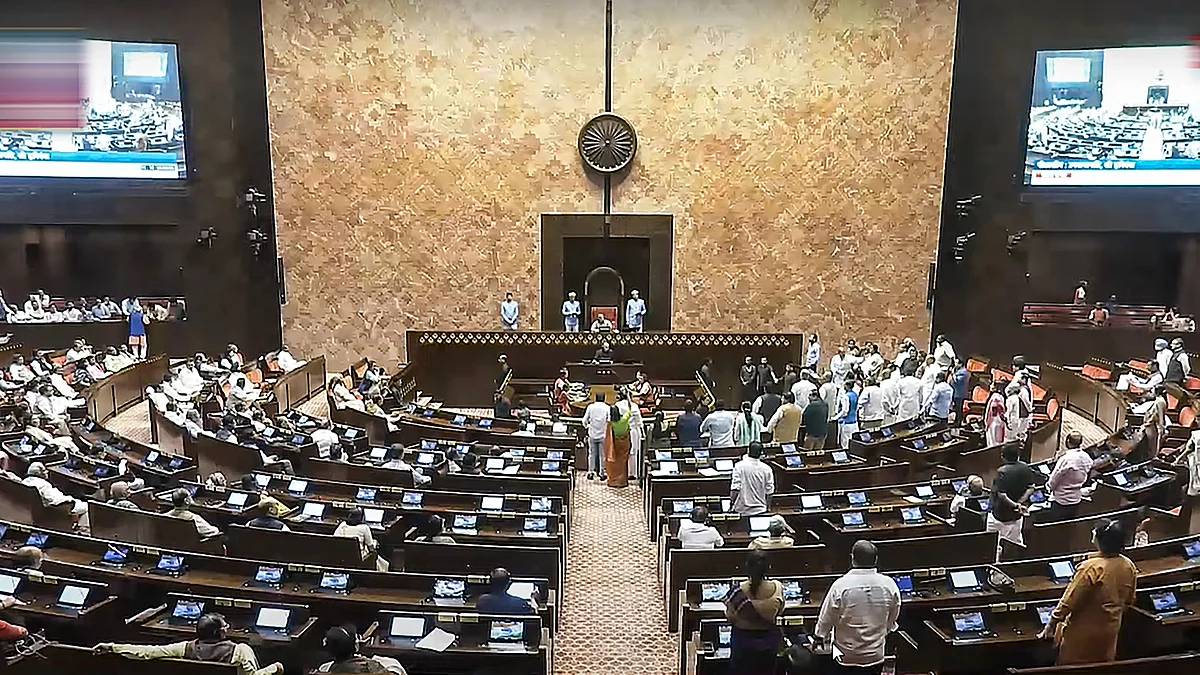POLITICS
No 'Vande Mataram', 'Jai Hind' slogans in Rajya Sabha: Congress slams BJP
On 24 November, Rajya Sabha secretariat reminded members not to use the slogans inside or outside the House

The Congress on Thursday took fresh aim at the BJP after the Rajya Sabha secretariat reminded MPs not to use slogans like 'Vande Mataram' and 'Jai Hind' in Parliament to maintain decorum, archly noting that those who “did not lose anything in the freedom movement and sided with the British” now seem to find fault with slogans born of that very struggle.
Congress spokesperson Supriya Shrinate said while the British once bristled at these slogans during the freedom movement, it is now the BJP expressing discomfort — a symmetry she clearly found hard to ignore.
On 24 November, the Rajya Sabha secretariat reminded members not to use slogans like 'Vande Mataram' and 'Jai Hind' inside or outside the House to maintain decorum, citing them as a breach of parliamentary etiquette — because nothing says “decorum” like outlawing well-worn patriotic chants.
Adding a touch more irony to the row, Opposition leaders pointed out that the same guardians of etiquette who object to 'Jai Hind' have often stayed remarkably silent when ruling party MPs break into loud chants of 'Modi Modi' inside the chamber — a slogan that, curiously enough, has never prompted any great anxiety about maintaining the “seriousness of proceedings”.
"I am shocked. What on earth is the objection to these slogans — the British had a problem with them, and now the BJP does too? What kind of people are they made of, those who find it difficult to utter the two most famous slogans of the freedom struggle in the House?" Shrinate asked in a video message.
Published: undefined
She said 'Jai Hind' means the victory of Hindustan — may India always be victorious, describing it as the most powerful slogan of the freedom struggle, one that “beats in the heart of every Indian”.
"It was composed in 1907 by the revolutionary Chempakaraman Pillai from Travancore, Kerala. Between 1914 and 1918, Pillai was active in the Indian freedom movement in Germany. He was the first to use 'Jai Hind' as a greeting and slogan among Indian revolutionaries living abroad.
"In 1943-44, Netaji Subhas Chandra Bose and the Azad Hind Fauj made 'Jai Hind' their official greeting and slogan, making it even more popular. Netaji would end all his speeches and radio message broadcasts from South-East Asia and Germany with 'Jai Hind'. Netaji chose it because it was secular and united everyone," she said.
Shrinate said after independence in 1947, 'Jai Hind' was adopted by the Indian armed forces as their official greeting and salute and that even today it instils a sense of patriotism in the army, paramilitary forces, and every Indian.
India's first Prime Minister Jawaharlal Nehru made it even more popular. He would often end his speeches with 'Jai Hind', she noted — something no one then seemed to think undermined decorum.
Talking of 'Vande Mataram', she said it is that glorious slogan and song in history that endows India with the status of a mother and pays homage to her, while bowing to her.
Written in 1870 by Bankimchandra Chattopadhyay, it was first sung by Rabindranath Tagore at the 1896 Indian National Congress session, and in 1905, during the Swadeshi movement, it became the political and nationalist slogan of the masses, she said.
Published: undefined
"Between 1906–1910, the British regime repeatedly banned it, leading to arrests for singing it. Whether it was protests for Swaraj or marches for independence, 'Vande Mataram' was always on the lips of the great heroes of freedom. Revolutionaries like Bhagat Singh and Khudiram Bose raised the slogan 'Vande Mataram' during their trials and at the time of hanging. On 24 January 1950, India's Constituent Assembly declared Vande Mataram as India's national song.
"Now think about it: who could possibly have a problem with these slogans? Only those who didn't lose even the tiniest bit of a little fingernail in the freedom movement. Those who were slaves and informants to the British," the Congress leader said.
The advisory, mentioned in the 'Handbook for Members of Rajya Sabha', was issued ahead of the commencement of the parliamentary session on 1 December.
"The decorum and the seriousness of the proceedings of the House require that there should be no 'Thanks', 'Thank You', 'Jai Hind', 'Vande Mataram' or any other slogans raised in the House," the Rajya Sabha notification said, while reminding MPs to observe parliamentary customs and conventions — customs which apparently now involve avoiding patriotic enthusiasm.
Sources — unnamed so far — in the Rajya Sabha secretariat cited in media reports said this is not the first time such an instruction has been issued. A similar circular was released under the UPA-led government in November 2005, also emphasising that raising slogans like 'Jai Hind' and 'Vande Mataram' was inconsistent with parliamentary customs and etiquette.
With agency inputs
Published: undefined
Follow us on: Facebook, Twitter, Google News, Instagram
Join our official telegram channel (@nationalherald) and stay updated with the latest headlines
Published: undefined